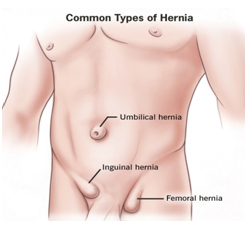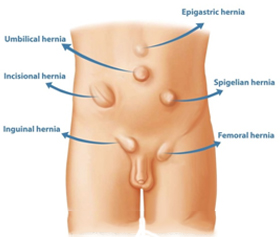Hernia
What is a Hernia?
A hernia occurs when an organ pushes through an opening in the muscle or tissue that holds it in place so in short a bulging of an organ or tissue through an abnormal opening is known as Hernia.
What Causes Hernia ?
Followings are the common causes of muscle weakness or strain that can lead to a hernia:
• a congenital condition that occurs during development in the womb and is present from birth
• aging
• damage from an injury or surgery
• chronic coughing or chronic obstructive pulmonary disorder (COPD)
• strenuous exercise or lifting heavy weights
• pregnancy, especially having multiple pregnancies
• constipation, which causes you to strain when having a bowel movement
• being overweight or obese
• Persistent coughing or sneezing
Types of Hernia ?
Followings are the various types of hernia:
1. Inguinal Hernia : most common variety
2. Umbilical Hernia
3. Para-umbilical Hernia
4. Incisional Hernia
5. Femoral Hernia
6. Epigasrtic Hernia
7. Lumbar Hernia
8. Spigelian Hernia
9. Obturator Hernia
10. Gluteal Hernia


What are the symptoms of Hernia?
In many cases :
A hernia is simple painless swelling that presents no problems
In certain cases :
A hernia may, however, be the cause of discomfort and pain, with symptoms often becoming worse when standing, straining, or lifting heavy items.
In some cases, a hernia needs immediate surgery, for instance, when part of the gut becomes obstructed or strangulated by an inguinal hernia.
Immediate medical attention should be sought if an inguinal hernia produces acute abdominal complaints such as :
• pain
• nausea
• vomiting
• the bulge cannot be pushed back into the abdomen
How One can Diagnose about Hernia?
A physical examination is usually needed to diagnose an inguinal hernia. Your doctor will check for a swelling or lump in the groin area. Because standing and coughing can make a hernia more prominent, you will likely be asked to stand and cough or strain.
Sometimes your doctor might order an imaging test, such as an abdominal ultrasound(USG Abdomen) or CT scan.
What is the Treatment of Hernia ?
Hernia usually do not get better on their own, and surgery is the only way to repair them. One of three types of hernia surgery can be performed:
• Open surgery, in which a cut is made into the body at the location of the hernia. The hernial content is set back in place and the weakened muscle wall is stitched back and mesh is kept.
• Laparoscopic surgery involves the same type of repair. However, instead of large incision, tiny incisions are made to allow for the insertion of surgical tools to complete the procedure.
• Robotic hernia repair like laparoscopic surgery, uses a laparoscope and specialized insturments. With robotic surgery, the surgeon is seated at a console in the operating room and handles the surgical instruments from the console.
Each type of surgery has its advantages and disadvantages. Patient must ask his or her surgeon which is best for his or her treatment.
Animated video about Hernia and its operation : -
• https://www.youtube.com/watch?v=GciYSjdLR-w
What can happen if a Hernia is not treated ?
If you don’t treat Hernia then the hernia can grow larger and may become painful or can develop complications.
Complications of an untreated hernia may include :
• Obstruction (incarceration): Part of the intestine becomes stuck in the hernia and causing nausea, vomiting, abdominal pain, and a painful lump in the groin.
• Strangulation: Part of the intestine is trapped in the hernia that cuts off its blood supply. In such cases, emergency surgery (within hours of occurring) is necessary to prevent blackening of intestine and more serious complications.
How can a Hernia be Prevented ?
• Avoid Obesity (Over-Weight) by eating a healthy diet and exercising.
• Eat enough fruits and green leafy vegetables to avoid constipation.
• Use correct form when lifting weights or heavy objects.
• Consult your doctor when you are ill with persistent coughs or sneezing.
• Don’t smoke, as the habit can lead to coughing that triggers a hernia.




